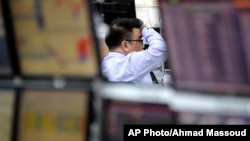South Korean economic reforms, made in part to minimize the impact of a potential international financial crisis, make it a likely target for charges of unfair currency manipulation by the United States.
There is growing concern in South Korea and in other emerging markets that the administration of U.S. President Donald Trump will use allegations of currency manipulation to force trade concessions as part of his economic agenda to give American manufactures a greater competitive advantage in international markets.
“So who is the most likely target of a manipulation charge? Obviously South Korea,” said economist Benn Steil with the Council on Foreign Relations in New York.
Why South Korea?
President Trump has indicated his intention to renegotiate what he considers unfair trade deals that put American industries at a global competitive disadvantage. After taking office in January he immediately pulled out of the multilateral Trans Pacific Partnership (TPP) free trade agreement, and U.S. trade officials are looking for ways to revise the North American Free Trade Agreement (NAFTA.)
Trump has also been highly critical of the U.S., South Korea bilateral free trade agreement (KORUS FTA) as a “job killing deal” that “doubled our trade deficit with South Korea and destroyed nearly 100,000 American jobs."
The U.S. Trade Representative (USTR) recently recommended reconsideration of the KORUS FTA due to the rising trade deficit between the South Korea and the U.S. The report noted that U.S. exports to South Korea in 2016 were down $1.2 billion from 2011, the year before the free trade agreement went into effect, while imports of South Korean goods increased by $13 billion.
Currency manipulation conditions
As for South Korean currency manipulation charges, the U.S. may have a legal case that it could use to pressure changes to the bilateral free trade agreement.
After the 1997 Asian financial crisis, South Korea implemented reforms endorsed by the International Monetary Fund to make the national economy less vulnerable to another sudden global economic downturn. The government in Seoul complied with the IMF recommendations to establish a large current account surplus (trade surplus,), large U.S. dollar foreign exchange reserves, and a low level of foreign ownership of domestic assets. These economic assets helped South Korea minimize the impact of the financial crisis of 2008.
However, these same conditions are the key criteria listed by the U.S. Congress for determining the existence of currency manipulation. Economists say it creates a fundamental contradiction in the dollar based international financial system to urge countries to protect themselves, then to accuse them of protectionism.
“If an emerging market does exactly what the IMF identifies as being the key steps they could take to prevent a financial crisis in their country, they will be the most likely to be targeted for currency manipulation charges by the U.S. Congress,” said Steil.
Bargaining chip
Advocates for South Korea argue that Seoul has intervened in international exchanges by buying or selling substantial sums of foreign currency, only to stabilize the value its Won, not to undervalue it. And despite the large trade deficit with the U.S., South Korean companies like Hyundai and Samsung are investing heavily in the U.S., more so than American companies are investing in South Korea.
Fair or not, South Korea’s current situation, with a bilateral trade deal that the Trump has labeled unfair and possibly meeting the legal definition of currency manipulation, leaves it politically and legally vulnerable. Such a complaint could be made to the World Trade Organization, but it is hard to prove and the resolution process would involve extensive negotiations.
James Nolt, an international political economy analyst with the World Policy Institute says the Trump administration would most likely use the threat of currency manipulation as leverage to force South Korea to reduce non-tariff related regulations that have reportedly been imposed to undermine the intent of the KORUS FTA and to open up new markets to American products.
“It will probably be in the context of a bilateral negotiation where he will use that as one of the bargaining chips,” said Nolt.
Why not China?
Trump had repeatedly attacked China as a currency manipulator, and even said on day one in his administration he would formally charge China as a currency manipulator. But he has not acted on that promise because Beijing has been intervening in currency exchanges to increase the value of its currency the Yuan to maintain investor confidence. And a stronger Chinese Yuan benefits American exporters by making their products somewhat cheaper.
Youmi Kim contributed to this report.





